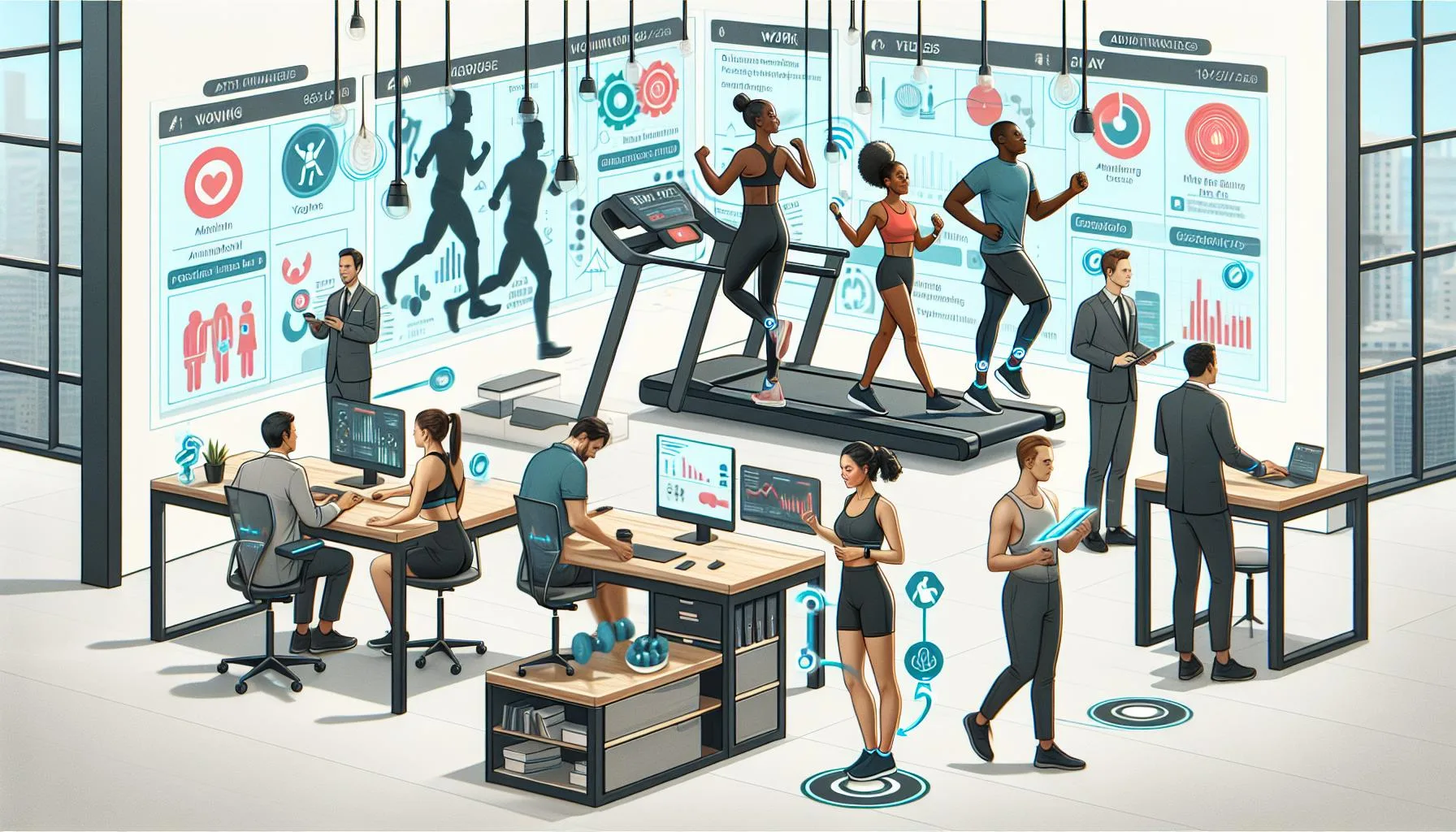In today’s fast-paced world, technology has become a cornerstone in shaping workplace dynamics. It’s not just about having the latest gadgets; it’s how these tools empower us to perform better, stay connected, and maintain a healthy work-life balance. As we dive into the tech benefits for employees, we’ll uncover the myriad ways technology is revolutionising the modern workplace.
From enhancing communication to enabling remote work, technology is at the heart of creating more efficient and flexible working environments. It’s fascinating to see how tech benefits not only streamline operations but also significantly contribute to employee satisfaction and engagement. Let’s explore how these technological advancements are making a positive impact on our professional lives.
- Exploring Technological Benefits for Modern Employees
- Empowering Employees with Technology
- Access to Learning and Development Resources
- Automation and Streamlined Processes
- Technology’s Impact on Employee Well-being and Satisfaction
- Access to Wellness Programs and Fitness Tracking Apps
- Customisable Work Environments with Smart Office Solutions
Exploring Technological Benefits for Modern Employees
In today’s rapidly evolving workplace, technological advancements have revolutionised how we approach our work, offering numerous benefits that cater to the modern employee’s needs. From enhancing communication to enabling flexible work arrangements, technology’s role in fostering an efficient, flexible, and employee-centric work environment can’t be overstated.
Enhanced Communication and Collaboration Tools
One of the most significant ways technology benefits employees is through improved communication and collaboration. With the advent of various software and applications, team members can now stay connected regardless of their physical location. Tools such as Slack, Microsoft Teams, and Zoom have become staples in our everyday work life, enabling real-time communication, video conferencing, and seamless collaboration on projects.
Key benefits include:
- Real-time communication: Instant messaging and video calls facilitate swift problem-solving and decision-making.
- Document sharing and collaboration: Cloud-based services allow employees to work on documents simultaneously, reducing the time spent on sending files back and forth.
This technological leap in communication not only enhances productivity but also helps in building stronger relationships among team members, fostering a sense of community and belonging.
Flexible Work Arrangements Enabled by Technology
Another pivotal aspect where technology shines is in its ability to provide flexible work arrangements. The shift towards remote work, which was greatly accelerated by the COVID-19 pandemic, would not have been possible without technological support. Employees now have the freedom to design their work schedules around their personal lives, contributing to a healthier work-life balance.
Technological tools that support flexible working include:
- Virtual Private Networks (VPNs): Secure access to company networks anywhere in the world.
- Project management tools: Platforms like Asana and Trello that help in tracking progress and managing tasks efficiently.
| Advantage | Description |
|---|---|
| Work-life balance | Employees can juggle personal commitments with work demands. |
| Increased productivity | Flexible schedules often lead to higher productivity levels. |
Through the implementation of these technologies, companies are not only able to attract top talent by offering flexible work conditions but also retain their employees by respecting their need for a balanced life.
By leveraging these technological benefits, we can create a more inclusive, efficient, and satisfying work environment for modern employees, ultimately leading to heightened innovation, productivity, and employee well-being.
Empowering Employees with Technology
In today’s fast-paced business environment, keeping up with work demands means leveraging technology to empower our employees. Technology’s role has evolved from simply facilitating tasks to becoming the backbone that drives efficiency, creativity, and inclusivity in the modern workplace. As we further explore this transformation, let’s delve into specific aspects where technology significantly benefits employees.
Increased Productivity through Time Management Apps
One of the most tangible benefits we’ve observed is the remarkable improvement in productivity through the use of time management apps. These applications, such as Trello, Asana, and Todoist, offer streamlined task management features that allow employees to prioritise their work, set deadlines, and collaborate more efficiently. The adoption of these tools has led to:
- A reduction in missed deadlines
- Improved task prioritisation
- Enhanced team collaboration
By simplifying task oversight, employees can focus more on the execution of their responsibilities, thereby reducing stress and increasing their overall work satisfaction. Moreover, many of these apps offer analytics features, giving employees insights into their work patterns and helping them identify areas for improvement.

Remote Work Capabilities and Virtual Office Solutions
The shift towards remote work was significantly accelerated by recent global events, and technology has been crucial in making this transition as smooth as possible. Virtual Private Network (VPN) services and remote desktop software have ensured that employees can access company networks securely from any location. Meanwhile, project management platforms like Slack and Zoom have become the new conference rooms, allowing for real-time collaboration and communication regardless of geographical barriers. This has not only maintained but in many cases, enhanced the productivity and flexibility of workforces around the globe.
The adoption of cloud-based services and virtual office solutions has also enabled:
- Greater flexibility in work locations
- Reduced commute times and associated stress
- More opportunities for work-life balance
By equipping our employees with the tools they need to work efficiently from anywhere, we’re not just supporting their professional growth; we’re also acknowledging the importance of their personal well-being. This holistic approach to employee empowerment through technology is what sets modern, forward-thinking organisations apart.
Access to Learning and Development Resources
In today’s fast-paced work environment, access to learning and development resources stands out as a critical tech benefit for employees. This section dives deeper into how technology facilitates continuous growth and skill enhancement through personalised learning platforms and efficient task management systems.
Personalised Learning Platforms for Skill Development
We’re witnessing a revolutionary change in how employees acquire new skills and knowledge. Personalised learning platforms, such as LinkedIn Learning, Coursera, and Udemy, provide a diverse range of courses tailored to individual learning paces and preferences. The flexibility of these platforms allows employees to learn at their own pace, making it easier to balance work and personal development.
Furthermore, these platforms offer courses designed by industry experts in a wide array of subjects from programming languages to leadership skills. This means employees can stay up-to-date with the latest industry trends and technological advancements without leaving their desks. The immediate application of these skills can lead to improved job performance and career progression.
- Advantages include:
- Customisable learning paths tailored to career goals
- Access to a global community for networking and support
- A boost in employee engagement and satisfaction
Efficient Task Management Systems
In addition to learning platforms, efficient task management systems like Trello, Asana, and Monday.com have become indispensable for modern workplaces. These tools not only support project management but also foster a culture of transparency and accountability among team members.
By streamlining workflows and centralising communication, these systems reduce the time spent on administrative tasks, freeing up more time for learning and development activities. They allow for easy tracking of progress on personal development goals or specific learning modules, integrating seamlessly with many of the aforementioned learning platforms.
- Key benefits include:
- Enhanced collaboration and communication
- Improved task prioritisation and time management
- Real-time feedback on tasks and projects
Leveraging technology in learning and development not only enriches the employee experience but also equips organisations with a more skilled and adaptive workforce. By providing access to personalised learning resources and implementing efficient task management systems, we’re setting the stage for continuous improvement and innovation.
Automation and Streamlined Processes
In today’s fast-paced work environment, automation and streamlined processes are no longer a luxury but a necessity. They not only enhance efficiency but also significantly reduce the risk of human error, leading to more consistent and reliable outcomes. Within this framework, let’s delve into how these technological advances specifically benefit employees by making their jobs easier and more productive.
Automated Workflows for Repetitive Tasks
One of the most tangible benefits of technology in the workplace is the automation of repetitive tasks. This includes everything from data entry to scheduling and email responses. By automating these processes, we free up valuable time for employees, allowing them to focus on more strategic and creative tasks that require human intelligence and insight. This shift not only boosts productivity but also enhances job satisfaction, as employees are more engaged in meaningful work rather than mundane tasks.
- Increased productivity: Tasks are completed faster and more efficiently.
- Reduced errors: Automated systems are less prone to mistakes than humans.
- Employee satisfaction: Engaging in higher-value work leads to higher job satisfaction.
Simplified Onboarding Processes through Technology
The onboarding experience is crucial in setting the tone for an employee’s journey within a company. With the introduction of technology, onboarding processes have been significantly simplified and made more engaging. Digital platforms can now efficiently handle paperwork, training schedules, and policy briefings, providing new hires with a seamless and interactive experience. This not only reduces the administrative burden on HR departments but also accelerates the integration of new employees into their teams and the company culture.
- Quick integration: New employees become productive members of the team more quickly.
- Interactive learning: Digital tools offer engaging ways to learn about company policies and job duties.
- Reduced administrative load: Automating the onboarding process eases the workload on HR departments.
By incorporating technology to automate workflows and streamline onboarding processes, we’re not only enhancing the efficiency and productivity of our workforce but also improving their overall job satisfaction. This dual benefit reinforces the significance of technology in creating a more dynamic, engaged, and competent workforce ready to meet the challenges of today and tomorrow.
Technology’s Impact on Employee Well-being and Satisfaction
Work-Life Balance Facilitated by Remote Tools
In today’s fast-paced world, achieving a healthy work-life balance is paramount for our well-being. Thanks to technology, this once elusive goal is now within our grasp. Remote tools, such as video conferencing software, project management apps, and real-time collaboration platforms, have reshaped the way we work, making it possible for us to perform our duties from virtually anywhere. This flexibility allows us to better manage our time, blending professional responsibilities with personal activities more seamlessly than ever before.
Studies show that employees who have the freedom to work remotely report higher levels of job satisfaction. For instance, a survey conducted by Buffer in 2020 found that 98% of respondents would like to have the option to work remotely, at least some of the time, for the rest of their careers. This overwhelming preference highlights the significant impact that remote tools have on our overall happiness and satisfaction at work.
Mental Health Support Apps and Resources
Our mental health is just as crucial as our physical health, and, luckily, technology has made strides in this area as well. A myriad of apps and online resources are now available to support our mental well-being, offering services that range from guided meditation sessions to on-demand counselling. These tools provide us with convenient and confidential access to mental health support, empowering us to take charge of our emotional well-being.
Apps like Headspace and Calm have gained popularity for their role in promoting mindfulness and reducing stress. Meanwhile, platforms such as BetterHelp and Talkspace connect users with licensed therapists, making professional help more accessible than ever. The availability of these resources can lead to significant improvements in our mental health, ultimately enhancing our job satisfaction and overall quality of life.
By integrating these technological advancements into our daily routines, we’re better equipped to navigate the challenges of modern work life. The support they provide in balancing our professional and personal lives and in managing our mental health is invaluable. Technology plays a pivotal role in improving our well-being and satisfaction, proving that its benefits extend far beyond mere productivity enhancements.
Access to Wellness Programs and Fitness Tracking Apps
The rise of technology in the workplace has brought about a significant shift in how we manage our health and well-being. With access to wellness programs and fitness tracking apps, employees today are better equipped to maintain a healthy lifestyle, even within the high demands of modern work environments.
Promoting Healthy Habits and Active Lifestyles
In our pursuit of a balanced work-life, incorporating technology that supports health and wellness has become indispensable. Wellness programs, often offered as part of an employee benefits package, provide a comprehensive approach to health. These programs might include subscriptions to fitness apps, access to online nutritional guidance, and participation in virtual fitness challenges that not only encourage physical activity but also foster a sense of community among colleagues.
Fitness-tracking apps play a crucial role in promoting active lifestyles. They offer personalised insights into one’s daily activity levels, sleep patterns, and exercise regimes. By setting goals and tracking progress, employees are more motivated to incorporate regular physical activity into their daily routines. The real-time data provided by these apps makes it easier for individuals to understand their health metrics and make informed decisions about their lifestyle choices.
Real-time Feedback for Better Health Monitoring
The availability of real-time feedback is perhaps one of the most compelling features of fitness-tracking apps. This immediate insight into physical health parameters allows employees to monitor their well-being on a granular level. Heart rate monitoring, step counting, and sleep quality assessment are just a few examples of the metrics these apps provide. This data not only encourages users to stay on track with their health goals but also enables early detection of potential health issues before they escalate.
Furthermore, some fitness apps are now incorporating mental health monitoring features. These include mood tracking and stress management tools, highlighting the pivotal role that mental well-being plays in overall health. By capturing real-time data on one’s emotional state, individuals can take proactive steps towards managing stress and cultivating a more balanced lifestyle.
Through access to wellness programs and fitness tracking apps, we’re not just improving our physical health; we’re also investing in our mental and emotional well-being. This holistic approach to health maintenance is essential in today’s fast-paced work environment, where the lines between work and personal life are increasingly blurred. With these tools at our disposal, we can navigate the challenges of modern work with greater resilience, health, and overall satisfaction.
Customisable Work Environments with Smart Office Solutions
In today’s dynamic workplace, customisable work environments are more than just a trend; they’re a necessity for fostering a productive and satisfied workforce. With the advent of smart office solutions, we’re witnessing a transformation in how office spaces are designed, utilised, and experienced. These innovative technologies allow for personalised workspace settings and energy-efficient systems, offering a blend of comfort and sustainability that benefits both employees and organisations.
Personalised Workspace Settings for Employee Comfort
The cornerstone of smart office solutions lies in their ability to provide personalised workspace settings. This means that employees can adjust their surroundings to suit their preferences, contributing significantly to their comfort and productivity. From adjustable desks and ergonomic chairs that promote better posture and reduce physical strain to climate control and lighting that can be customised via a smartphone app, the possibilities are endless.
Moreover, smart technology offers noise-cancelling options and creates soundscapes that mask distracting noises, allowing employees to focus better. These customisations not only enhance employee satisfaction but also improve overall well-being, making it easier for everyone to thrive in their work environment.
Energy-Efficient Office Systems for Sustainability
In addition to personal comfort, smart office solutions are at the forefront of promoting sustainability within the workspace. Energy-efficient systems integrate seamlessly into these smart environments, optimising the use of resources and reducing the office’s carbon footprint. Features such as LED lighting that adjusts based on the time of day and occupancy sensors to manage heating, ventilation, and air conditioning (HVAC) systems are becoming commonplace. These smart-systems not only lower energy consumption but also lead to significant cost savings over time.
By implementing energy-efficient office systems, we’re taking a step towards creating not only a more sustainable work environment but also promoting a culture of responsibility and awareness towards environmental issues among employees. This dual focus on employee comfort and sustainability showcases the true potential of smart office solutions in shaping the future of workspaces.
Conclusion
We’ve seen how technology’s role in the workplace is more crucial than ever, especially when it comes to enhancing our health and well-being. By integrating wellness programmes and fitness tracking apps, we’re not just working smarter but healthier too. The shift towards customisable and smart office solutions further highlights the value of technology in creating workspaces that aren’t just about productivity but also about our comfort and the planet’s sustainability. The future of work is not just about what we do, but how we do it, ensuring we’re in the best possible environment to thrive.
Check out Avado, the UK’s most trusted CIPD course provider today for HR and L&D courses:
CIPD Level 3 HR Courses: The CIPD Level 3 Certificate in People Practice is ideal for anyone looking to start a career in either HR or Learning and Development.
CIPD Level 5 HR Courses: The CIPD Level 5 Associate Diploma in People Management will help you build on your existing HR knowledge.
CIPD Level 5 L&D Courses: The CIPD Level 5 Diploma in Organisational Learning and Development is the most comprehensive course available for L&D professionals, ideal for you if you want to formalise your existing experience, skills and knowledge.
CIPD Level 7 HR Courses: The CIPD Level 7 Advanced Diploma is aimed at expanding learners’ autonomy so they can strategically direct organisations and their people.

 15 min read
15 min read 





